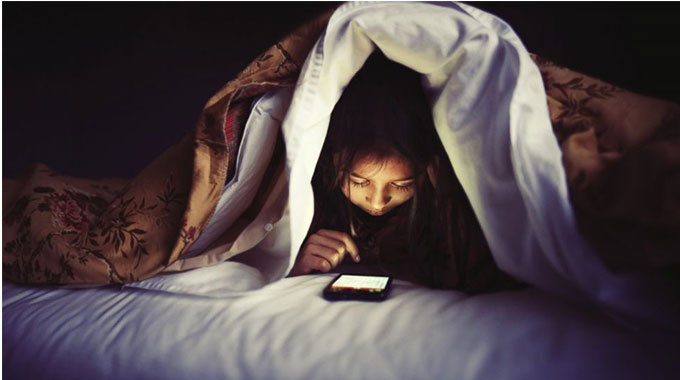Screentime before bedtime unhealthy for children

Andile Tshuma
The general trend is that younger children need more sleep and naturally, should be allowed less screen time compared to adults.
Gone are the days of the good bedtime stories and a cup of warm milk before sending kids to bed. These days parents find it easy to give kids smartphones to watch some bedtime shows.
Those that grew up when grandparents, aunts, uncles, mothers and fathers told folktales are privileged. Those moments remain cherished. Remember going to your grandparents’ house for the holidays or going to your rural home, all the stories told around a fire. It was wonderful.
There was real human interaction.
I used to love reading Sunrise readers and Uncle Arthur’s bedtime stories before going to bed. I owned very few of the volumes but borrowed a lot of them from the library. I think most people my age or older could say they had a healthy childhood.
I got messages from concerned parents who were responding to last week’s column on digital addictions and how they affect child development during the week. I then felt that the issue could be the subject matter for this week too.
Most parents who communicated with me had interesting confessions to make. They know that too much gadget time is not healthy but it keeps sanity in the household. On the surface, screen time appears to get the job done as a pre-bedtime ritual for getting the little ones to sleep as it helps them to relax, unwind and most importantly, keeps them happy. Unfortunately, a growing body of research is proving that screen time before bedtime is detrimental to your child’s sleep.
The most obvious way in which screen time disrupts your child’s sleep is that it pushes back bedtime for your child. Children love the moving graphics, the cheerful music and the seemingly endless on-demand entertainment they get from the screen and as such will give up their sleep for more screen time.
When screen time is unsupervised or curfews aren’t strictly imposed, children end up pushing their bedtime back.
It keeps your child alert and awake way longer than he or she should be.
Even if curfews are strictly enforced, the very nature of engaging in screen time will make it harder for your child to fall asleep. First of all, content that keeps your child engrossed also keeps their brains alert, way too alert for sleep. Besides fuelling them with adrenaline, screen time also messes with the expression of the sleep hormone in your child’s body.
Screen time before bedtime doesn’t only keep your child up late at night and make it harder for them to fall asleep, it also heightens your child’s risk of developing insomnia, a sleep condition in which sleep disturbances are experienced over a prolonged period of time, often lasting more than a month.
We all know how difficult it is to function when we are running low on sleep. Our focus and alertness falters, and we can’t make ourselves move faster than a snail’s pace. For children, however, the signs that they aren’t sleeping enough can be a bit different, not all sleep-deprived children behave like walking zombies. Sometimes, unusually high levels of energy akin to hyperactivity is the result of not getting enough sleep.
When children don’t get enough sleep, they can be a lot less physically active and end up spending more time engaged in sedentary activities. Sleep deprived children who engage in considerable amounts of screen time also tend to have poorer dietary habits such as eating more junk food, which contributes to the problem of obesity as well. While obesity itself may not be that serious a problem since children’s bodies are in a state of development, being obese can put your child at risk of developing type 2 diabetes, which is a growing health epidemic among young children in recent times.
A lack of sleep is often associated with depression, anxiety and other mental health orders, not just in children but in adults as well. This is because quality, restorative sleep is extremely important in alleviating mental stress as children experience stress too and are perhaps more sensitive to its effects. Children who don’t get enough sleep are often unmotivated, uninterested, irritable and even aggressive.
A short attention span and trouble concentrating are side effects of not having enough sleep, so naturally this could lead to problems with academic performance. Children who stay up late on their devices will tend to be sleepier in classes and this affects their ability to learn and recall information.
Ultimately, less screen time is always better as it will help your child get more quality sleep. No matter how old your child is, quality sleep is of utmost importance to ensuring good physical and mental health.
The most obvious way to help your child get more sleep is definitely by limiting their screen time. For babies and toddlers, avoid exposing them to screen time as they are still young. For children in pre-school and primary school, imposing screen time curfews is extremely important.
Children are very impressionable and mimic what most adults do. Whatever habits you want your child to embody, be it sleeping early or spending less time on screens, you must exhibit it first. So, put away your smartphones and laptops at home, or at least don’t use them in front of your child and keep to the TV curfew limits that you designated.
At the end of the day, getting quality sleep is important for the child’s well-being. Screen time is playing an increasingly bigger role in the lives of our children and we should take active steps to protect them from its disruptive effects.









Comments